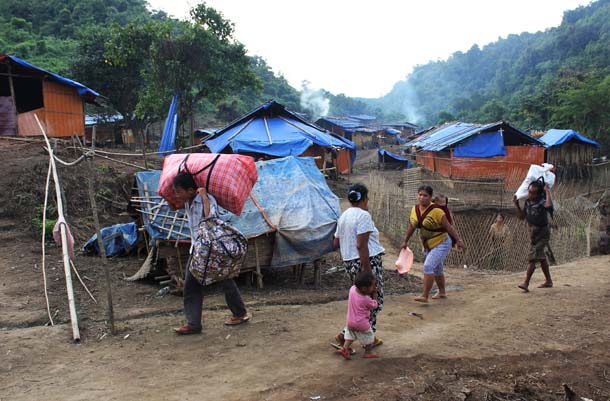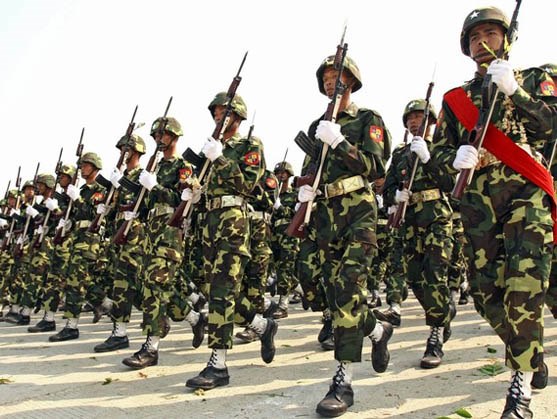Posts Tagged ‘Crimes against humanity’ (225 found)
The inquiry report of the Myanmar National Human Rights Commission into the death of Ko Aung Naing (a) Ko Aung Kyaw Naing (a) Ko Par Gyi
(1) On the 24th of October 2014, the Ministry of Defense issued a news report about the death of Ko Aung Naing, an information officer, holding the rank of a captain in the KKO (Klohhtoobor Karen Organization) group, which appeared in the local newspapers on the 25th of October. Regarding this matter the Myanmar National Human Rights commission received a complaint from Min Thi Ha of Education Digest asking the Commission to investigate into the death of journalist Ko Par Gyi to reveal the truth behind this matter. The commission also received an undated letter from one Ma Thandar, which was addressed to (17) other designations, to look into the unlawful detention and also another complaint letter from Ma Thandar, dated the 30th of October with the heading of “The complaint by the family on the unlawful detention, torture and murder of Ko Aung Kyaw Naing (a) Ko Par Gyi.” […]
• • •How Many More Lives? Burma Army Must Immediately Halt its Offensives in Kachin State
 Despite repeated calls from the international community, governments and civil society for an immediate halt to hostilities in Kachin and northern Shan State, on 19 November, 2014 the Burma Army fired several artillery missiles as “warning shots” onto the Kachin Independent Army’s (KIA) training academy in Laiza, Kachin State, killing 23 cadets and seriously injuring 20 others. Laiza is not only the KIA’s strong-hold. It is a city with over 20,000 civilians and a host to over 17,000 internally displaced persons (IDPs).
Despite repeated calls from the international community, governments and civil society for an immediate halt to hostilities in Kachin and northern Shan State, on 19 November, 2014 the Burma Army fired several artillery missiles as “warning shots” onto the Kachin Independent Army’s (KIA) training academy in Laiza, Kachin State, killing 23 cadets and seriously injuring 20 others. Laiza is not only the KIA’s strong-hold. It is a city with over 20,000 civilians and a host to over 17,000 internally displaced persons (IDPs).
Just days after the killing in Laiza, the Burma Army began firing shells near IDP camps. Some of the shells landed near a boarding school housing about 1,000 IDP children. These subsequent attacks near the camps threatened the lives of over 10,000 IDPs and raised much anxiety among the most vulnerable communities who have continuously fled the conflict. Fortunately, no one was hurt in these attacks, but many of the IDPs were forced to flee again in terror to the nearby jungle.
The narrative of “reform” and the sweeping political changes that have been praised and funded by the international community is quickly coming apart at the seams. While the Burma Government continues to use its rhetoric of change and democracy to encourage international governments, donors and investors to continue funding the peace process and development projects, they made one of the most deadly targeted attacks in Kachin State since the ceasefire broke down in 2011. This attack raised serious doubts among the ethnic groups who have threatened to abandon talks aimed at achieving a nationwide ceasefire accord. These talks, ongoing for nearly two years, have proved to be thus far redundant, as the Burma Army obviously has no other goal than the elimination of all ethnic armed groups without committing to any genuine, structural reforms. […]
• • •‘If they had hope, they would speak’: The Ongoing Use of State-Sponsored Sexual Violence in Burma’s Ethnic Communities
In January 2014, the Women’s League of Burma (WLB) published a report which demonstrated the systematic use of rape by the Burma Army as a strategy to subjugate communities across the country. We documented over a hundred cases of sexual violence in the years since President Thein Sein took office – a number which we believe grossly underestimates the true scale of the problem. Drawing on evidence gathered by our member organisations across Burma, we argued that there are clear links between militarisation, investment and human rights abuses. We also proposed a number of steps to uproot the culture of impunity which surrounds sexual violence, and prevents survivors from obtaining justice. Whilst recent months have seen positive action taken in several areas, the pillars which provide impunity for perpetrators of human rights abuses remain in place. In January, we called for constitutional reform to place the military under civilian control; the establishment of effective judicial and non-judicial mechanisms to investigate human rights abuses, particularly those relating to sexual violence, and; greater participation of women in the peace process dialogue. […]
• • •‘If they had hope, they would speak’: The Ongoing Use of State Sponsored Sexual Violence in Burma’s Ethnic Communities
(Yangon, November 24, 2014) – Burma Army soldiers continue to engage in acts of sexual violence on a widespread scale, and women and human rights defenders in ethnic communities face harassment and persecution, the Women’s League of Burma (WLB) said in a new report published today to coincide with International Day for the Elimination of Violence against Women. […]
• • •Impunity for Military Abuses Has to End
 On 7 November, the International Human Rights Clinic (the Clinic) at Harvard Law School published a Legal Memorandum which establishes that certain Burma Army commanders are guilty of crimes against humanity and war crimes under international criminal law. The Legal Memorandum submits its findings on the basis of a three-year investigation (the Investigation) into human rights abuses associated with a Burma Army offensive in Karen State, which was launched in late 2005 and continued into 2008 (the Offensive). The Clinic chose this offensive “because it was one of the largest in recent memory and was widely condemned by the international community.” The Investigation focused specifically on the conduct of two military units – Southern Regional Military Command (SRMC) and Light Infantry Division 66 (LID 66) – in Thandaung Township, Karen State.
On 7 November, the International Human Rights Clinic (the Clinic) at Harvard Law School published a Legal Memorandum which establishes that certain Burma Army commanders are guilty of crimes against humanity and war crimes under international criminal law. The Legal Memorandum submits its findings on the basis of a three-year investigation (the Investigation) into human rights abuses associated with a Burma Army offensive in Karen State, which was launched in late 2005 and continued into 2008 (the Offensive). The Clinic chose this offensive “because it was one of the largest in recent memory and was widely condemned by the international community.” The Investigation focused specifically on the conduct of two military units – Southern Regional Military Command (SRMC) and Light Infantry Division 66 (LID 66) – in Thandaung Township, Karen State.
Articles 7 and 8 of the Rome Statute of the International Criminal Court (ICC) set out the legal requirements for an action to qualify as a “crime against humanity” or a “war crime,” respectively. The essence of a “crime against humanity” is that the act in question should be “part of a widespread and systematic attack directed against any civilian population, with knowledge of the attack.” Similarly, Article 8 stipulates that a “war crime” must be committed “as part of a plan or policy or as part of a large-scale commission of such crimes,” and must constitute a grave breach of the Geneva Conventions 1949, which regulate the conduct of armed conflict […]
• • •55 Organisations Worldwide Call for Action for Peace on Kachin Anniversary
Three years ago today, the Burma Army broke a 17-year ceasefire with the Kachin Independence Army (KIA) and unleashed a major new military offensive against the Kachin people. Since 9 June 2011, over 120,000 Kachin people have been displaced, forced to flee their homes. At least 200 villages have been destroyed. A humanitarian emergency unfolded, with a desperate need for shelter, food and medical care. As the Kachin Peace Talk Creation Group has said, “the impact of the war this time has been enormous. Many have lost land, plantations […]
• • •Myanmar: UN expert raises alarm on Rakhine State
GENEVA – The United Nations Special Rapporteur on the human rights situation in Myanmar, Tomás Ojea Quintana, today pressed the alarm bell on the further deterioration of the human rights situation in Rakhine State […]
• • •Statement No. (2/2014) Investigation of the Incident at the Ducheeratan Village
1. A team from the Myanmar National Human Rights Commission (MNHRC) comprising the Secretary and three members visited Sittwe and Maung Taw Township and made a tour of the Ducheeratan village tract from 30 January to 3 February 2014, in order to investigate the news reports on the incident that had occurred at Ducheeratan middle village […]
• • •Statement From Members Of The European Burma Network
Members of the European Burma Network express their deep concern at reports of further massacres of members of the Rohingya ethnic group in Burma. The report by the United Nations that at least 48 Rohingya men women and children have been killed, and that police were involved, provides yet more evidence that the current approach by both the government of Burma and the European Union to address ongoing abuses against the Rohingya is failing […]
• • •EU Must Highlight Ongoing Human Rights Abuses in UNGA Burma Resolution
Members of the European Burma Network welcome the decision of the European Union to continue with the annual United Nations General Assembly resolution on Burma.
We are concerned that despite the fact that the government of Burma has not met a single one of the twenty main demands made in last year’s resolution, the European Union had seriously considered discontinuing the resolution […]
• • •









 All posts
All posts